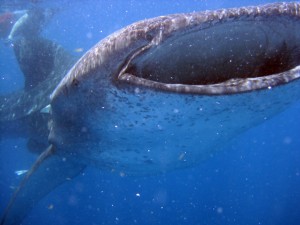
Last week a writer for Shanghaiist released an article that may come to be know as the most influential blog post in the history of the internet. In his post, he shares photos taken after a fisherman in Rizhao, Shandong Province captured a 10 Whale Shark. He remind his readers that this capture should “serve as steady reminders to never go into the ocean ever.” I write today to echo his sentiments. People need to be educated about this before it’s too late. That’s right, if we don’t act soon next time a Sharknado forms it wont be filled with mere hammerheads and great white but rather with the complete ferosity of the whale shark.
Let’s begin by exposing some of the lies that you may come across on the internet and setting the record straight.
It is suggested that these monsters are filter feeders. Upon reading that you may start to questions me: “How can a filter feed be a threat to people? Filter feeders eat just algae, plankton, and at most a small vertebrate right? There is no way that is a threat to me.” But you are wrong! Have you ever found yourself swimming in the ocean and come across a current you were incapable of swimming against? Well if you’re like me and every other person not named Michael Phelps then you fall under the category of plankton- an organism in the water column that cannot swim against the current. Also, “small vertebrate” is a very subjective term. In case you’re unfamiliar, national geographic lists the longest measured whale shark to be 12.2 meters. To a monstrosity that big nearly everything in the ocean is small, including you! Now rethink what a filter feeder eats. Yep, you got it, plankton and people. Next time you think that because a whale shark is harmless because it’s a filter feeder, think again!
Next I look to expose the myth that they are gentle creature and pose no threat to humans. A creature that can way upwards 21 metric tons moving towards you in the water cannot be harmless. Also, sources claim that whale sharks will play with divers and even give rides. Does that not sound the slightest bit suspicious?! Everyone knows that playing with your food is the fun part that leads to eating it! And these “rides” that the whales are giving sound more like a tactic to isolate divers to make them more vulnerable. Again, these researchers are not giving credit to the ferocity of these beasts.
The final point I would like to share is the fact that there are no reported deaths related to whale sharks. One diver survived an encounter in Mexico where we was partially sucked in, but managed to escape. He is lucky this happened, and is probably because the whale shark didn’t like how he tasted and of course there oesophagus is just mere inches across making it a bit difficult to move your body down their gullet. But a lack of evidence does not mean it hasn’t occured, it just means they get away with it unnoticed.
Editor’s note: This is of course the richest of satires.
Lalli, C.; Parsons, T. (1993). Biological Oceanography: An Introduction. Butterworth-Heinemann.
Morelle, Rebecca (17 November 2008). “Shark-cam captures ocean motion”. BBC News. Retrieved 30 July 2009.
Martin, R. Aidan. “Rhincodon or Rhiniodon? A Whale Shark by any Other Name”. ReefQuest Centre for Shark Research.
Compagno, Leonard J. V. (26 April 2002). Sharks of the World: An Annotated and Illustrated Catalogue of Shark Species Known to Date: Bullhead, Mackerel and Carpet Sharks 2. Food & Agriculture Organization of the United Nations (FAO). ISBN 978-92-5-104543-5. Retrieved 20 September 2009.
Open wide: The diver who nearly got swallowed by a whale shark”. Daily Mail (London). 21 July 2011.
